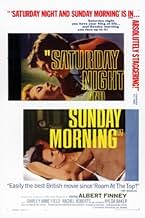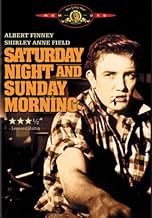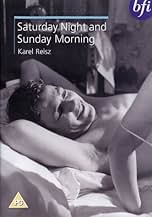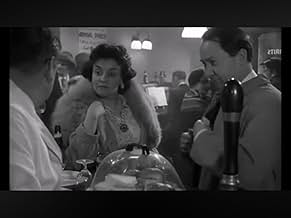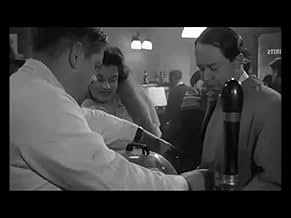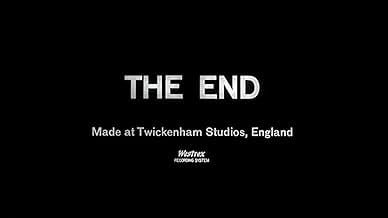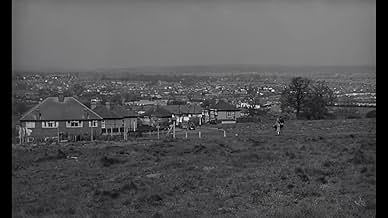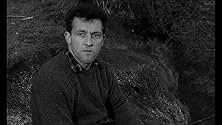A rebellious, hard-living factory worker juggles relationships with two women, one of whom is married to another man but pregnant with his child.A rebellious, hard-living factory worker juggles relationships with two women, one of whom is married to another man but pregnant with his child.A rebellious, hard-living factory worker juggles relationships with two women, one of whom is married to another man but pregnant with his child.
- Won 3 BAFTA Awards
- 10 wins & 3 nominations total
- Mrs. Seaton
- (as Elsie Wagstaffe)
- Loudmouth
- (as Colin Blakeley)
Featured reviews
Equally I knew that, on leaving, I would see his aunt (Hilda Baker) in the local chippy, and that Norman Rossington would be cycling to some nearby canal to fish. Indeed when Ben (my friend) and I left we went to our local for a quick pint and, I swear,we both had the uncanny feeling of being part of the film.
Time has passed and the working class East and West Midlands have change completely so it may not have such resonance for a new generation but if you want to know what a good slice of England looked and sounded like in the 1950s you should see it: it's better than any documentary. Indeed it is a great film.
The thing that deserves the most praise, however, is Sillitoe's script, which puts virtually all modern dramatic screenplays to shame. In a general way, the working class british films of the late 50s and 60s launched the tradition that leads to Loach, Leigh, Tim Roth, etc. This film's subtlety and ambivalence towards its leading character reminds me specifically of Mike Leigh at his very best.
It's hard work growing up, it always was, and it always will be.
This film was considered quite shocking at the time of its release because of its frank sexual situations and the freely-discussed topic of abortion. These themes aren't shocking anymore, but one reason for that is the introduction of them in films like this. Shot in black and white, it gives the viewer a picture of life in a bleak factory town, portrayed very realistically by director Karl Reisz. The actors are these people, they're not merely playing them. This is especially true of Finney, who sports a low-class accent and epitomizes the "angry young man" so prevalent in the late '50s. Finney's performance as a young man who takes out his work-week aggression on women, booze and mischief, is as revolutionary as Dean's or Brando's was in American cinema.
Finney is ably backed up by the supporting actors. Roberts is very effective as Brenda, a housewife married to a dull man, and Shirley Anne Field even dressed down is gorgeous as the ingénue who wins Arthur's heart and makes him look at the future. One wonders if he'll ever grow up sufficiently. She's going to have her hands full.
The dialect is very authentic and difficult to understand at times - I actually used my closed captioning. The dialect adds to the whole atmosphere of "Saturday Night and Sunday Morning," another of the rebel movies but in a class all by itself.
Did you know
- TriviaThe factory scenes were filmed in the same factory that original author Alan Sillitoe worked in during the war when he was making shells and other artillery. At the time of filming, the factory was owned by the Raleigh bicycle company.
- GoofsWhen Arthur and Doreen meet for the first time, her packets of crisps on the counter disappear and reappear between shots.
- Quotes
Arthur Seaton: Mam called me barmy when I told her I fell of a gasometer for a bet. But I'm not barmy, I'm a fighting pit prop that wants a pint of beer, that's me. But if any knowing bastard says that's me I'll tell them I'm a dynamite dealer waiting to blow the factory to kingdom come. I'm me and nobody else. Whatever people say I am, that's what I'm not because they don't know a bloody thing about me! God knows what I am.
- ConnectionsFeatured in Viewpoint: We the Violent: Part 1 (1961)
- How long is Saturday Night and Sunday Morning?Powered by Alexa
Details
- Release date
- Country of origin
- Language
- Also known as
- Todo comienza el sabado
- Filming locations
- Production company
- See more company credits at IMDbPro
Box office
- Budget
- £100,000 (estimated)
- Gross worldwide
- $370
- Runtime
- 1h 29m(89 min)
- Color
- Aspect ratio
- 1.66 : 1


